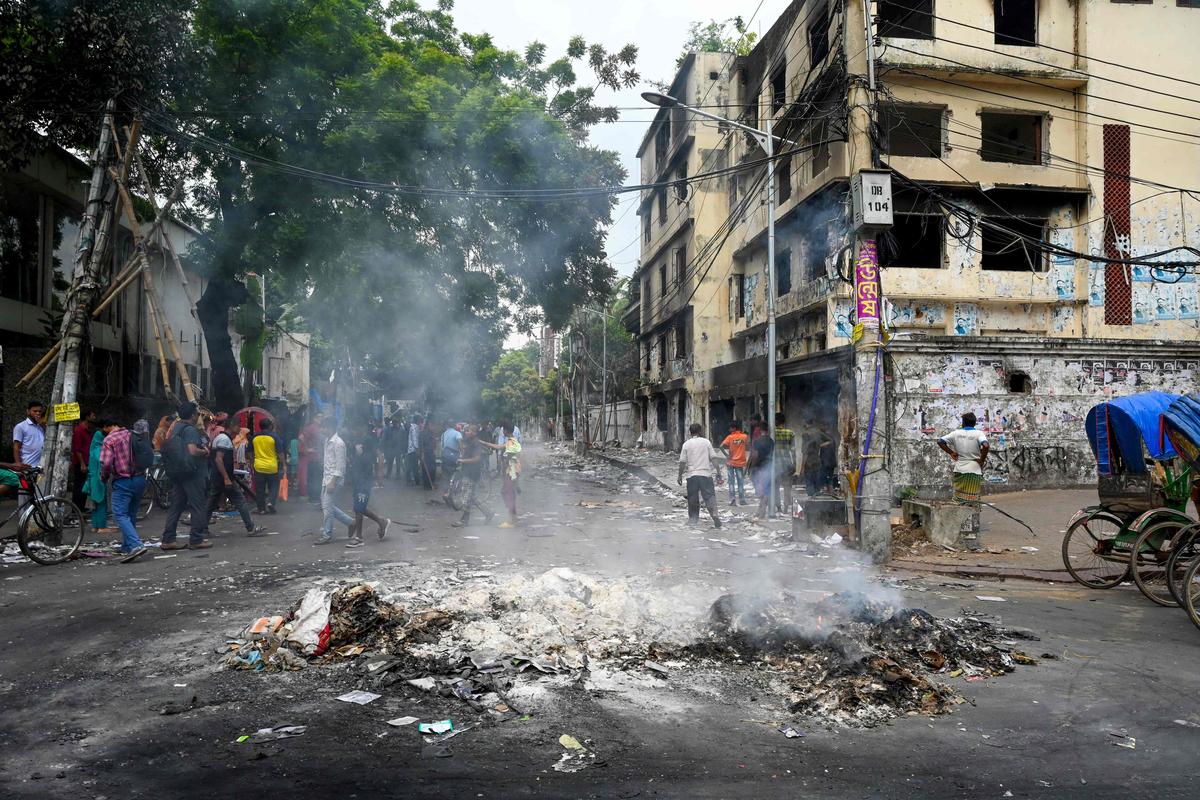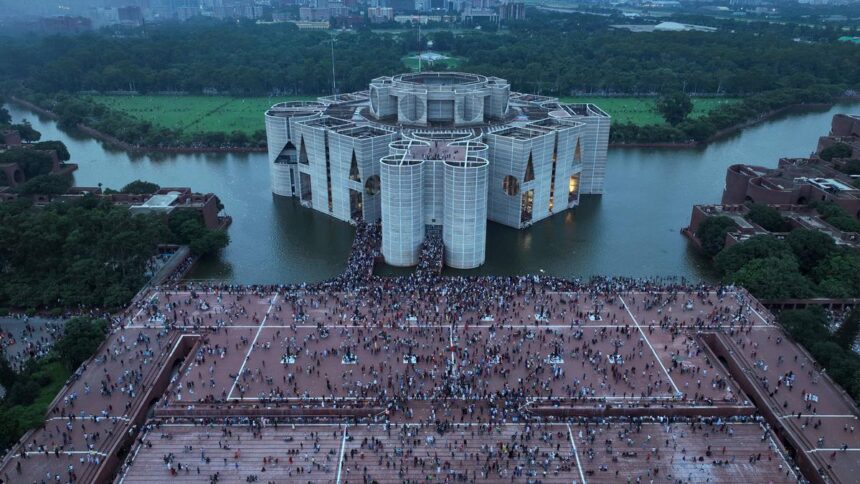In the early morning hours of July 20, 2024, a disturbing scene unfolded at Monsur Nagar Housing in Savar upazila, on the outskirts of Dhaka. About eight to 10 plainclothes men who identified themselves as the detective branch (DB) of the Bangladesh Police, surrounded the house of 70-year-old Abul Khair, who had fought in the 1971 war for freedom. The officers, armed and aggressive, started shouting and demanding Khair to open the gate, threatening to break it if he didn’t. Soon after, they forced their way in, seized the family’s phone and detained Khair’s two sons, Arif Sohel, 27, and Mohammad Ali Jowel.
When Jowel was released, Sohel disappeared for the next 36 hours. None of the police stations approached by the family refused to be detained; or they show arrest, said the family. They were allegedly beaten and not fed. For this brief spell, the family said Sohel was another victim of ‘enforced disappearance’, a common tactic Bangladeshis say was used by former Prime Minister Sheikh Hasina’s government to suppress dissent. Later, he was officially presented as arrested and placed on seven-day remand in the case his family said. Sohel’s father said, “The behavior of law enforcement agencies is similar to that of the Pakistani military during the Liberation War.”
Sohel is a student and convener of the Jahangir Nagar University Students Against Discrimination movement that swept the country from July 1. (quota has been withdrawn in 2018).
Student riots
Like many other movements around the world, including Mandal India Commission and China’s Tiananmen square, students across Bangladesh took to the streets by the thousands. They demanded the abolition of quotas and the establishment of a merit-based system. Underlying the anti-quota protests, however, was the fear that members of the Awami League, the political party that led Bangladesh’s independence movement against Pakistan, would benefit.

The student protest was met with a brutal reaction from the government. Residents went through raids, where thousands of students, opposition leaders, and others were arrested for their alleged involvement in the Students Against Discrimination movement. A curfew was imposed at midnight on July 19. Images of the army and police shooting students out of the country, with India saying this is an “internal matter” of Bangladesh, the same way Hasina’s government has explained the Indian Citizenship Amendment Act. 2022. In fact, Hasina is the first state guest to visit India after the Bharatiya Janata Party government came to power for a third term this year.
When the violence broke out, around 300 Indian students who had completed their MBBS degrees, returned home. The internet was cut off, and it was difficult to reach friends and relatives. So far, 439 people have died in the violence Hello Prothoma leading newspaper in Bangladesh.

Under pressure from students, the Supreme Court reduced the quota on July 21 to 5%, with an additional 2% for ethnic minorities. Sifat Hasan Sakib, one of the organizers of Dhaka’s government-run Jagannath University, said, “We are fighting discrimination, and students are winning, even at the cost of lives. We want a peaceful environment on the university campus, which has been missing for a long time because of the student wing of the Awami League, Bangladesh Chhatra League Regular elections of student unions can play an important role in protecting the rights of students.
Students say the Bangladesh Chhatra League dominates student life on campus, gives privileges only to its members, and takes on posts that other student organizations are not allowed to do. Abdullah Al Mamun, a recent graduate of Dhaka College’s English Department, expressed his frustration, said, “There is no other option but to take to the streets to protest….Sheikh Hasina has often boasted about economic development, but at the same time, she has allowed the Chhatra League to dismantle the education system in Bangladesh.
He said the integrity of the job exam was seriously damaged. “Usually there is a leak of exam papers. Also, viva boards are biased, often favoring candidates associated with the Chhatra League. This leaves the general student with no hope of getting a job. The system is rigged against us.

Smoke billows near the burning office of the Awami League party as anti-government protesters set it on fire in Dhaka on August 6, 2024, after Prime Minister Sheikh Hasina fled the country. | Photo credit: AFP
The tipping point of Bangladesh
Just as the uprising of 1857 was sparked by a long history of British oppression, the student movement arose out of political and social anxiety against authoritarianism and human rights abuses. Thousands joined from all over the country, and it was so strong that Hasina resigned in front of three heads of service and fled the country, on August 5, 2024. his future is uncertain.
When he came out of his official residence, Ganahaban, the public stormed the opulent place. The world sees images of people building suitcases and deep freezers, but also sheep, fish, and German Shepherd puppies. A statue of Sheikh Mujibur Rahman, Hasina’s father, who is considered the founding father of Bangladesh, was vandalized, the video went viral.
Watch: The story of Sheikh Hasina
The army chief, General Waker-Uz-Zaman, appealed for peace, and on August 6, 2024 it was announced that Muhammad Yunus, an 84-year-old microfinance pioneer who won the Nobel prize in 2006, would lead the interim government. , with 16 advisors, including two student representatives. The Hasina government has filed more than 200 cases against the founders of Grameen Bank, for corruption.


It’s not just student politics that is ruining Hasina’s government. According to Bangladeshi human rights organizations, security forces have carried out more than 600 executions since 2009. While some people have been released, produced in court, or said to have been killed in armed exchanges with security forces, nearly 100 people remain missing, he said. .
The act infuriated people. For example, Brigadier General (suspended) Abdullahil Amaan Azmi was released from the detention center known as Aynaghar (House of Mirrors), after eight years of captivity early on August 6. Azmi is the son of late Ghulam Azam, ex ameer (head) of Jamaat-e-Islami, a religious-based political party founded in 1941 and originating in present-day Pakistan. She was allegedly forcibly picked up from her home on August 23, 2016, and has since disappeared. Hasina’s government has repeatedly denied the existence of Aynaghar and 23 other detention camps, where political opponents are allegedly held.
Hasina’s government, on August 1, 2024, banned Jamaat-e-Islami, saying it posed a threat to public security. The Jamaat is a key ally of former Prime Minister Khaleda Zia’s Bangladesh Nationalist Party (BNP), who was later jailed on corruption charges but has now been released. “They (Jamaat and BNP) are only using students as shields,” Hasina said, while Italian Ambassador Antonio Alessandro called her out, news agency PTI reported.
Jamaat central executive committee member and the party’s media and publicity secretary, Matiur Rahman Akanda, called the 2024 election a “fake election”.
After the fall of Hasina’s regime, families of political prisoners secretly imprisoned under her rule have gathered in front of the Directorate General of Force Intelligence (DGFI) headquarters. Sanjida Islam Tulee, founder of Mayer Dak, an organization of families of victims of ‘enforced disappearance’, said, “We have learned from the recently released ex-army officer Brigadier General Abdullahil Aman Azmi that there are many others in Aynaghor. We went to the DGFI office to find out who who were detained there and spoke about the issue.They asked that the prisoners be released together instead of individually.

Media strangulation
Bangladeshi media often blame the government for interfering with freedom of speech and assembly. According to a research paper by the Center for Governance Studies (CGS), at least 451 journalists have been prosecuted under the Digital Security Act (DSA) since its inception and 255 people have been prosecuted for journalistic reporting. Among the accused, 209 journalists are associated with national-level Bangladeshi media and 197 with regional media outlets. The CGS found that at least 4,520 people were charged in 1,436 cases filed between October 2018 and September 2023.
Raihan Hossain, a journalist from Jago News, an online news outlet in Bangladesh, said journalists in Bangladesh face huge challenges, especially when reporting on sensitive issues like extra-judicial killings, enforced disappearances, and corruption.
He said, “Journalists who dare to investigate and report on this issue often face severe threats. The powers that be will silence us, using intimidation and fear to prevent negative coverage. It’s a constant battle, and many are put in positions where their safety is at risk just for trying to do their jobs.
He added that the situation was further complicated by the government’s ‘favoritism’ for certain media. “Newspapers that align with the government’s agenda are given many facilities and privileges, while those that try to maintain journalistic integrity often lack important resources. This makes it increasingly difficult for independent journalism to thrive, as the government’s influence on the media landscape creates an environment where the only voices that support the official narrative are can move forward.
A rise in minority violence
After Hasina’s death, there was also an increase in violence against the Hindu minority. According to the Bangladesh Hindu Buddhist Christian Unity Council (BHBCUC), 200-300 Hindu homes and businesses were destroyed, and 15-20 temples were damaged. Many were injured.
Rana Dasgupta, general secretary of BHBCUC Oikya Parishad said, “Some people whose houses were attacked may have joined Awami League politics immediately, but 98% Hindus are not involved in political activities.” He hoped the interim government would restore stability and protect minorities. Student and Jamaat leaders have issued a statement urging supporters to protect temples and churches as diplomats and rights groups have expressed concern over reports of attacks on minority groups.
new regime in Bangladesh | Lessons for India & South Asia
Monzurul Islam, president of Bangladesh Islami Chhatra Shibir, the student wing of Jamaat-e-Islami, said he did not consider any group to be a minority or a majority in the country: “Everyone is equal,” he said, despite the group’s beliefs. the reason for Hasina’s political dominance in the country is India. Hindus, who constitute 8% of the population of over 17 crore, are mostly supporters of the Awami League.

Photographer and human rights activist Shahidul Alam said, “India is effectively Bangladesh’s neighbor. It is also a major trading partner. It does not make sense that Bangladesh does not have a cordial relationship with India. They hope that future relations will be based on equality, rather than ties.” ‘relation’.




